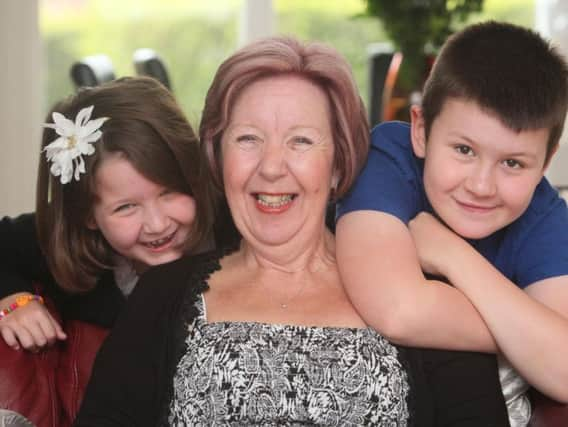Scottish woman's life saved after blood test trial picks up cancer - months before tumour visible


Rebecca Allison, 68, was picked to take part in what is thought to be the world's largest randomised controlled study using blood biomarkers to detect the presence of early-stage lung cancer.
Although she had been puffing away for most of her life, Rebecca had no symptoms of lung cancer.
Advertisement
Hide AdAdvertisement
Hide AdThe gran-of-two, from Carntyre, in the East End of Glasgow, had the test at the city's Royal Infirmary in February 2016.
But two weeks later, when an X-ray was carried out, no tumours were visible, and a CT scan came back negative.
It was only when a fifth scan was carried out 20 months later, that a 5cm tumour on her lung was visible.
In November 2017 Rebecca had surgery to remove the tumour at the Golden Jubilee Hospital in Clydebank, West Dunbartonshire.
She is now cancer free, and hopes the blood test can be rolled out across the NHS.
Rebecca said: "I went along to Glasgow Royal Infirmary and they took the test and it came back positive that I had lung cancer.
"I had no symptoms whatsoever.
"It was only 20 months later than a CT scan showed I had cancer.
"I'm now cancer free and I feel like the luckiest woman in the world.
"If I hadn't had that blood test I would never have known.
Advertisement
Hide AdAdvertisement
Hide Ad"I never told my family initially because I didn't want to worry them.
"I only told my husband that the blood test had come back positive, until that last scan.
"It was very weird knowing I had lung cancer before it showed in the scans but I'm so grateful I went for the blood test.
"My grandchildren are eight and six and when it happened you think, will I be there to see them grow up?
"I hope they can roll this out across the NHS because I think it will save many lives.
"I just want to thank the team because if it wasn't for them I wouldn't be here."
Some 12,210 patients from Glasgow, Lanarkshire and Tayside at high risk of developing lung cancer were recruited for the trial, which doctors say will have global implications for the early detection of the disease.
All were aged between 50 to 75 years old and lived in deprived communities, and were current or former smokers.
Advertisement
Hide AdAdvertisement
Hide AdThey were split into two groups, with the first group given X-rays and CT scans only if symptoms emerged.
The second group were given a blood test at the outset, and those with a positive result were offered immediate X-ray and CT scans, with follow-up scans every six months.
Over the two-year period of the study, a total of 71 people in the control group were diagnosed with lung cancer, and 56 in the blood test group.
However, late-stage diagnoses were "significantly lower" in the test group.
In the group that underwent the blood test, 41 per cent were diagnosed at stages one or two, compared to only 27 per cent in the control group.
The Early Detection of Cancer of the Lung Scotland study was led by Professor Frank Sullivan, an expert in primary care medicine at St Andrews University.
Mr Sullivan said: "These landmark findings are likely to have globally significant
implications for the early detection of lung cancer by showing how a simple blood test, followed by CT scans, is able to increase the number of patients diagnosed at an earlier stage of the disease, when surgery is still possible and prospects for survival much higher."
Advertisement
Hide AdAdvertisement
Hide AdThe blood test uses Oncimmune patented technology to detect the presence of auto-antibodies generated by the body's immune system as a natural defence against cancer cells.
Data indicates the test used in the study can detect cancer four years or more before current standard processes.
Joseph Carter, head of the British Lung Foundation Scotland, said: "An accurate blood test would be a game-changing moment for lung cancer diagnosis.
"This test could turn the tide against lung cancer, potentially saving thousands of lives every year and giving more people the chance of a cure."
Sara Hiom, Cancer Research UK's director of early diagnosis, said: "We hope that one day this could help doctors to know who is at greatest risk from lung cancer much sooner, and give them CT scans.
"The next steps will be to test this in more people."
Adam Hill, chief executive at Oncimmune, said: "We look forward to working with health authorities in Scotland and beyond to introduce EARLYCDT Lung more widely, with the aim of
saving lives and reducing costs for the NHS and other healthcare systems around the world."